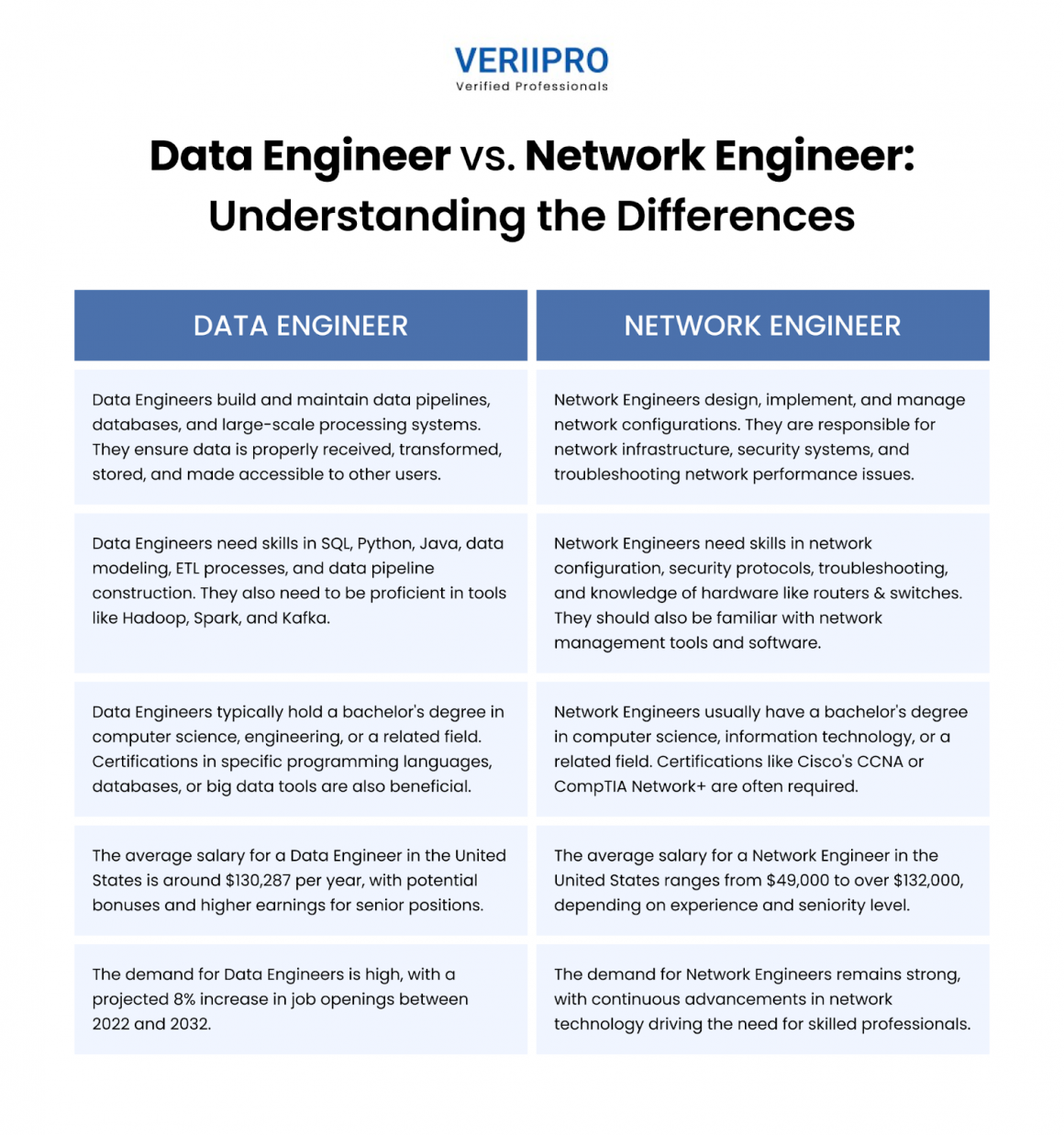Data Engineer vs. Network Engineer: Understanding the Differences
Searching for jobs in engineering but want to move away from traditional roles? How about exploring data engineer and network engineer jobs in the US? While the word “engineer” may be common to both, each has a very different role to play and requires distinct skill sets and qualifications. Both, however, are lucrative career options given the rapid advances being made in technology. This article helps you discover the key differences between Data Engineers and Network Engineers, including their roles, responsibilities, required skills, educational background, and career prospects. Let’s get started!
Who is a Data Engineer?
As they say, data is the new oil. Data is playing an increasingly important role in businesses of all shapes and sizes because it is only data that powers the right business decisions that ultimately lead to growth, expansion, and profits. Enter data engineers.
So, who is a Data Engineer?
A Data Engineer is a data professional who has expertise in data engineering and programming to build systems that collect, manage, and convert raw data into valuable information that business analysts can then use to optimize their organization’s performance. Typically, Data Engineers have degrees in mathematics, statistics, and computer science since they are required to build and maintain data systems and construct datasets that are easy to analyze and support their company’s requirements.
Data Engineer jobs include becoming a data architect, data scientist, or chief data officer.
Who is a Network Engineer?
While a Data Engineer helps businesses make sense of vast amounts of data, a Network Engineer plays an equally crucial role in any tech-driven organization. They are the ones who work in the IT department and design, build, implement, and maintain computer networks for organizations. A Network Engineer also performs system upgrades, including service packs, patches, hotfixes, and security configurations. Within networking, there are different specializations and a Network Engineer could work with wired or wireless networks, software-defined networking, or LAN side.

Key Responsibilities of Data Engineers
So, what is the typical Data Engineer job description? What does a Data Engineer do? Data Engineers are responsible for many day-to-day tasks, including:
1. Data pipelines
Data Engineers are responsible for designing pipelines that can handle huge amounts of data and ensuring that data is sanitized, standardized, and safe. They also build and test processes to consolidate data from multiple sources to be stored securely in a central location.
2. Data warehouses
Building and maintaining centralized data locations like data warehouses to assist the analytics teams in using structured and unstructured data in their models.
3. Data quality assurance
This is one of their key roles as incorrect data can have a staggeringly negative impact on a company’s bottom line. A Data Engineer ensures data quality and governance by identifying and fixing errors, inconsistencies, and adding missing values in the data. This ensures the data is aligned with the company’s needs.
4. Big data
Data Engineers also manage vast data sets and build applications to move, transform, and analyze this data. They also develop algorithms to transform data into actionable insights.
5. Data retention policies
Data Engineers work closely with management to establish policies regarding how long any data needs to be kept in the system, paying close attention to its legal implications, storage costs, and business needs. They also create new data validation methods and data analysis tools.
6. Machine learning models
A Data Engineer also has to ensure that all machine learning models are deployed safely and efficiently.
Key Responsibilities of Network Engineers
Broadly speaking, Network Engineers design, implement, monitor, and manage an organization’s networks. The day-to-day job responsibilities of a Network Engineer include:
1. Network performance
Making sure all networks function at their optimum best is the role of a Network Engineer. This includes tasks like monitoring network performance, system availability, and reliability. Network Engineers are also required to maximize performance by troubleshooting network problems and outages and scheduling upgrades.
2. Network security
Network security involves implementing security systems and software to protect the organization’s technological infrastructure by establishing and enforcing policies and defining and monitoring access. This could include creating firewalls and updating virus protection software and data security systems. They also have to design system configuration and direct system installation.
3. Network hardware
A Network Engineer also installs and configures the company’s network hardware, such as routers, switches, firewalls, and servers, besides also being responsible for maintaining this hardware and equipment.
4. Network documentation
Documenting network configurations, processes, and procedures is a part of the KRA of a Network Engineer and they also need to keep logs of downtime, repair, and meter charges.
5. Network training
Since technology is always evolving, keeping in touch with the latest trends is absolutely vital for a Network Engineer so that their processes never become outdated. Senior Network Engineers could also provide network engineering support and training to other team members, including how to use new network resources and programs.
6. Collaboration
Network Engineers need to perform many tasks in collaboration with other teams and IT professionals, such as infrastructure architects and IT managers, to develop and implement network security measures, or to resolve potential issues.
Job Outlook and Career Path
So, what does the job outlook and career path for both a Data Engineer and a Network Engineer look like in the US?
Data Engineers
There is a huge demand for Data Engineers across industries in the United States due to the increasing use of data to drive business decisions.
Since data engineering is the most in-demand job in technology right now, it is a highly competitive field to break into. Aspiring candidates must have more than just strong technical skills and also focus on acquiring a solid grasp of how data and pipelines produce business value.
Data Engineers are the backbone of an organization’s data infrastructure. They are heavily involved in coding, optimizing queries, monitoring workflows, and troubleshooting issues to keep data systems running smoothly. Not surprisingly, Data Engineering is a crucial field in the age of big data and machine learning, and the job outlook is promising. With an estimated 8% growth rate for data engineering jobs, the demand for data engineering skills is growing rapidly. The number of big data engineer jobs is expected to increase by 33% between 2020 and 2030.
Some of the key skills that a Data Engineer would need to get hand-picked by the top recruiters are:
- Strong programming knowledge in Python or Java
- Expertise in SQL
- Familiarity with big data tools like Apache Hadoop
Additional requirements and skills could include:
- Previous experience as a Data Engineer or in a similar role
- Technical expertise in data models, data mining, and segmentation techniques
- Excellent numerical and analytical skills
- A bachelor’s or a master’s degree in Computer Science, IT, or a similar field
- A master’s data engineering certification (e.g., IBM Certified Data Engineer)
To validate their skills to potential employers, Data Engineers can get internationally recognized certifications such as Associate Big Data Engineer, Cloudera Certified Professional Data Engineer, and Google Professional Data Engineer.
The typical Data Engineer salary ranges from $122,000 to $200,000 per year according to 2024 estimates by Glassdoor.
Network Engineers
There will be no shortage of job opportunities for Network Engineers in the U.S., as according to the Bureau of Labor Statistics, employment of Network Engineers is projected to grow 6% from 2019 to 2029. Major tech hubs like San Francisco, Seattle, Austin, and New York City offer many openings at companies both large and small.
As a Network Engineer, your chances of getting a high-paying job increase if you possess the following skills and qualifications:
- Network knowledge
- Network design and implementation
- Network troubleshooting
- Tracking budget expenses
- Project management
- Problem-solving and analytical skills
- Time-management skills
- Strong documentation skills
- LAN knowledge
- Network hardware configuration
- Network performance tuning
- People management
Roles in Network Engineering include becoming a Network Administrator, Network Architect, Network Analyst, and Network Security Engineer.
Network Engineers are some of the highest-paid professionals in the tech space, with a median salary of over $110,000 per year in the U.S. The level of education, years of experience, job responsibilities, and location also impact salaries. Senior Network Engineers with many years of experience and specialized certifications can make $150,000 or more.
So, overall, the job prospects for both Data Engineers and Network Engineers look very promising. And if you have a reliable partner like Veriipro helping you reach the right opportunities at the right time, then there’s no stopping your career growth! Reach out to our seasoned professionals at Veriipro and get hired today!
Frequently Asked Questions –
What does a Data Engineer do?
Data Engineers build and maintain data pipelines, databases, and large-scale processing systems. They ensure data is properly received, transformed, stored, and made accessible to other users.
What does a Network Engineer do?
Network Engineers design, implement, and manage network configurations. They are responsible for network infrastructure, security systems, and troubleshooting network performance issues.
What skills are required for a Data Engineer?
Data Engineers need skills in SQL, Python, Java, data modeling, ETL processes, and data pipeline construction. They also need to be proficient in tools like Hadoop, Spark, and Kafka.
What skills are required for a Network Engineer?
Network Engineers need skills in network configuration, security protocols, troubleshooting, and knowledge of hardware like routers and switches. They should also be familiar with network management tools and software.
What educational background is needed for a Data Engineer?
Data Engineers typically hold a bachelor’s degree in computer science, engineering, or a related field. Certifications in specific programming languages, databases, or big data tools are also beneficial.
What educational background is needed for a Network Engineer?
Network Engineers usually have a bachelor’s degree in computer science, information technology, or a related field. Certifications like
What is the average salary for a Data Engineer?
The average salary for a Data Engineer in the United States is around $130,287 per year, with potential bonuses and higher earnings for senior positions
What is the average salary for a Network Engineer?
The average salary for a Network Engineer in the United States ranges from $49,000 to over $132,000, depending on experience and seniority level
What is the job outlook for Data Engineers?
The demand for Data Engineers is high, with a projected 8% increase in job openings between 2022 and 2032
What is the job outlook for Network Engineers?
The demand for Network Engineers remains strong, with continuous advancements in network technology driving the need for skilled professionals








